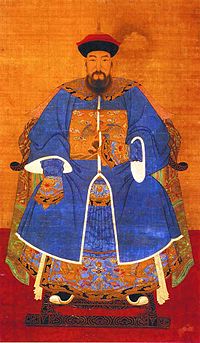Hong Chengchou
| Hong Chengchou | |
|---|---|

Portrait of Hong Chengchou
|
|
| Official of the Qing dynasty | |
| Born | 1593 |
| Died | 1665 (aged 71–72) |
| Names | |
| Traditional Chinese | 洪承疇 |
| Simplified Chinese | 洪承畴 |
| Pinyin | Hóng Chéngchóu |
| Wade–Giles | Hung Ch'eng-ch'ou |
| Courtesy name | Yanyan (Chinese: 彥演; pinyin: Yànyǎn; Wade–Giles: Yen-yen) |
| Other names |
|
Hong Chengchou (1593–1665), courtesy name Yanyan and art name Hengjiu, was a Chinese official who served under the Ming and Qing dynasties. He was born in present-day Liangshan Village, Yingdu Town, Nan'an County, Quanzhou, Fujian Province, China. After obtaining the position of a jinshi (進士; successful candidate) in the imperial examination in 1616 during the reign of the Wanli Emperor, he joined the civil service of the Ming Empire and served as an official in Shaanxi. During the reign of the Chongzhen Emperor (r. 1627–1644), he was promoted to Minister of War and Viceroy of Suliao (薊遼; an area which included parts of present-day Shandong, Hebei and Tianjin). In 1642, he surrendered and defected to the Manchu-led Qing Empire after his defeat at the Battle of Songjin. He became one of the Qing Empire's leading Han Chinese scholar-politicians. While he was in office, he encouraged the Manchu rulers to adopt Han Chinese culture and provided advice to the Qing government on how to consolidate its control over the former territories of the fallen Ming Empire. Apart from Dorgon and Fan Wencheng (范文程), Hong Chengchou was regarded as one of the most influential politicians in the early Qing dynasty. However, he was also villainised by the Han Chinese for his defection to the Qing Empire and for his suppression of the Southern Ming dynasty (a short-lived state formed by remnants of the fallen Ming Empire).
Hong Chengchou started his career under the Ming Empire by leading military campaigns against rebels in the 1620s. Like Yuan Chonghuan, Xu Guangqi, Sun Yuanhua and other Ming generals, he was also a leading military strategist and proponent of the adoption of European cannons by the Ming armies. He served as the Governor of Shaanxi and Sanbian and was responsible for countering rebel forces led by Li Zicheng. He defeated Li Zicheng at the Battle of Tongguan Nanyuan in 1638, after which Li fled with only 18 men. After that battle, he was transferred to the northern border to counter invaders from the Manchu-led Qing Empire.
...
Wikipedia
